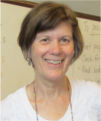
by Gail Lemley Burnett
“Are you Hispanic?” isn’t supposed to be a tough question. Yet every time I meet it while completing a census form or medical history, my pencil hovers between “Yes” and “No” and my eyes search for the most accurate answer, which is never there: “Sort of.”
I’m one of the millions of Americans who occasionally change their ethnic designation. It’s complicated. My mother’s father emigrated with his family from Mazatlán, Mexico, when he was in his teens. He married my grandmother — not Hispanic — in Los Angeles in the late 1920s, and they had two daughters. My grandfather’s family was big, noisy, and still firmly tied to the Mexican state of Sinaloa. When my curly-haired Aunt Gloria was a little girl, the family took her there at festival time and dressed her as an adorable señorita. My mother and Gloria grew up in southern California in the 1940s and ’50s with a Spanish surname and were sometimes told, in those racist “good old days,” that they were “not like the other Mexican girls — you’re clean.” How could that history not be a part of our heritage?
And yet — in truth, my Mexican grandfather was little more than a shadow in my mother’s childhood, and far less than that in mine. My grandparents divorced when my mother was very young, and he behaved the way divorced dads too often do. He backed away. He remarried and eventually had two more daughters whom my mother and aunt have never met. When my mother married at age 18, her Irish-American stepfather gave her away. Her “real” father didn’t even attend.
We did visit the family once, when I was probably 5 or 6 years old. I have the haziest memory of a crowded room and a handsome, dark-haired old man. I stopped in Mazatlán during a trip to Mexico in 1976, curious but clueless about how to begin exploring any connection I might have to the place. Did I pass a fourth cousin on the street? Was it just my imagination that the woman selling meat in the marketplace looked a little like my mom? I was locked out of further knowledge by a lack of Spanish or of a coherent family story.
This sketchy history hasn’t stopped my brother and at least one cousin from identifying themselves as Hispanic. They speak Spanish fluently, and they live in parts of California (easy enough to do) where they have plenty of chances to use it. It feels right to them; my cousin Steve even goes by “Esteban” on Facebook.
I now live in Maine, where Spanish is hard to find. And thanks to my fair-haired father, I’ve yet to have anyone, who meets me for the first time, ask whether I’m Latina. In fact, if I mention my heritage, the usual response is “Really?” — as in “Are you sure?”
Sometimes I ask myself whether it really matters at all. Your family is who you share your life with, not just your DNA. Years ago my husband and I took our very young son on an exploratory tour of the part of West Virginia where my father was born. We met his first cousin, whom my dad had never known. She lived on Lemley Street; the phone book had half an inch of people with our unusual last name. But my father was only moderately interested. His life has always been on the West Coast. He’s a Californian, not a West Virginian. He doubted the accuracy of his cousin’s memories of his mother. I don’t think he saw the point of exploring his roots in a place where he was never really planted.
Most of me believes that it’s my actual family — not my Mexican background — that matters. But there’s a little part — the part that hovers over that checklist, that finds my mother’s unknown half-sisters a delicious mystery — that thinks it’s important. It’s a small piece of our story, sure, but I’d never want to forget it. And sometimes, just for a little while, I’m Hispanic.
Gail Lemley Burnett is an ESL teacher, a transplanted Californian and a freelance journalist. Contact her at burnett.gail@gmail.com
